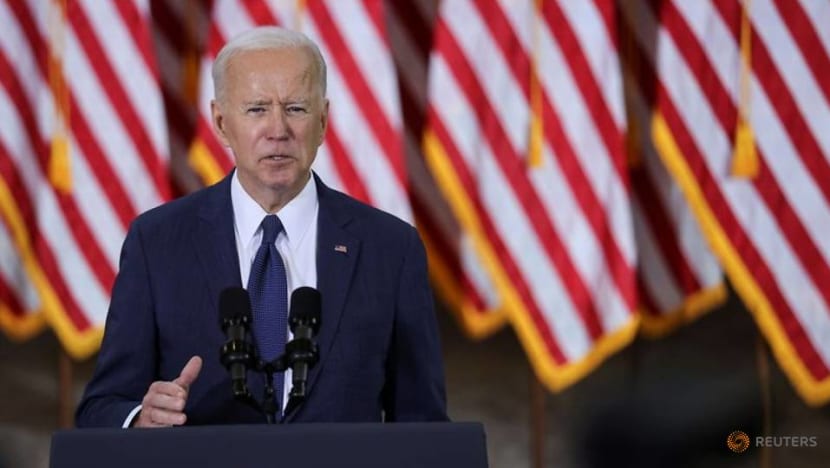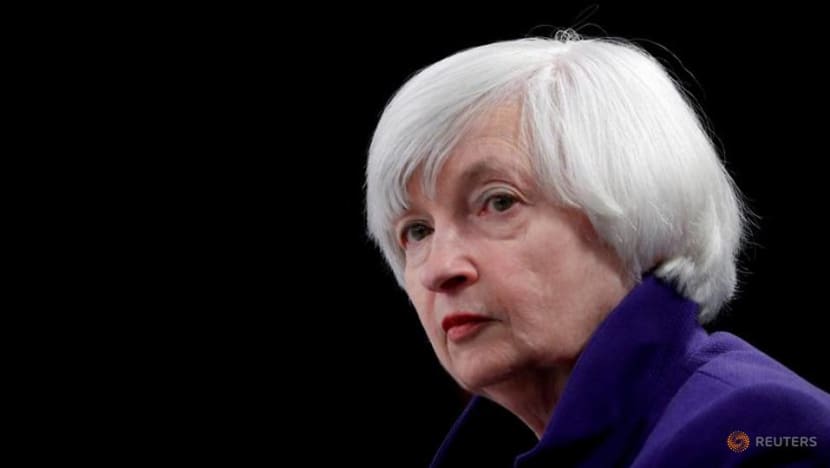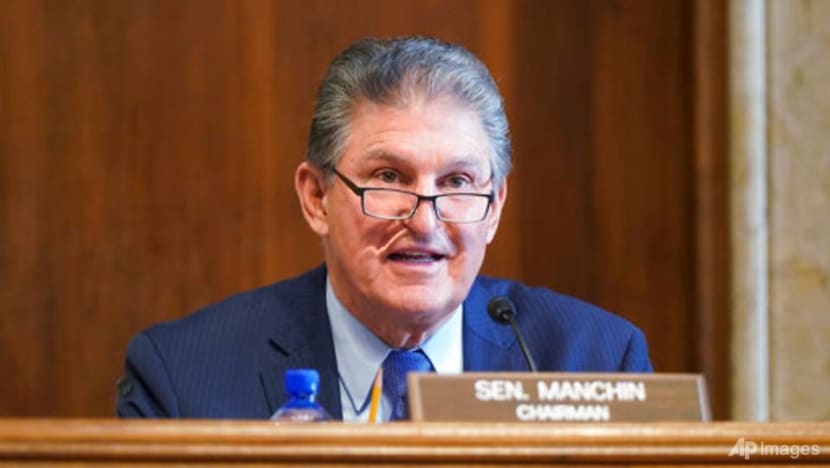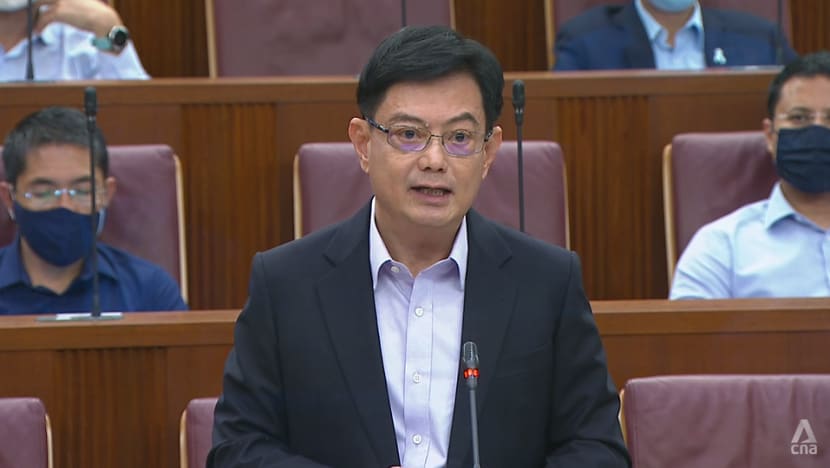commentary Commentary
Commentary: US proposed global minimum corporate tax has implications for Singapore
Joe Biden’s move to raise taxes may be well-timed, given domestic demands for government expenditure and a growing global acceptance that corporate taxes must be raised. But this has implications for Singapore, says NUS Business School’s Assoc Prof Simon Poh.

US President Joe Biden speaks about his US$2 trillion infrastructure plan during an event to tout the plan at Carpenters Pittsburgh Training Center in Pittsburgh, Pennsylvania, US, on Mar 31, 2021. (Photo: REUTERS/Jonathan Ernst)
SINGAPORE: US President Joe Biden proposed an ultra-ambitious US$2.3 trillion infrastructure bill in end-March.
It was hailed as a “once-in-a-generation” investment that will reposition the US at the forefront of the global economic stage, ahead of China.
The cost will be largely funded by raising corporate tax, slated to go up from 21 per cent to 28 per cent, if the bill is passed.
This marked reversal of Biden’s predecessor Donald Trump’s tax policy, which saw the corporate tax rate from 35 per cent to 21 per cent in 2017, taps onto wider, popular calls for US Big Business to pay their fair share.
US Treasury Secretary Janet Yellen followed up last week with calls for a global minimum corporate tax of 21 per cent for multinational corporations, signaling that a collective international effort is required to end the “30-year race to the bottom”.
These latest proposals surprised few as they were featured prominently in Joe Biden’s election campaign.
READ: Commentary: Joe Biden’s quietly revolutionary first 100 days
READ: Commentary: Biden’s big fiscal gamble on America’s future
TRUMP DESERVES SOME CREDIT
However, Mr Biden doesn’t deserve full credit for this policy shift.
In effect, the Trump administration had earlier introduced the concept of a global minimum tax in 2017, which took the form of a Global Intangible Low-Taxed Income (GILTI), taxing foreign profits at the rate of 10.5 per cent, in a bid to discourage US companies from parking profits overseas.
Mr Biden, in his election campaign, proposed a doubling of this tax, in addition to raising the corporate tax rate to 28 per cent.
Yellen merely echoed this now, the main difference being the collective stand she hopes the US can take together with the G20 to get this entire tax plan approved.

Mr Biden will find support among his party. For a long time, many Democrats have been calling for higher taxes to be imposed on corporates, a sharp contrast to the Trump Administration’s approach of lowering taxes on corporates in the hopes of stimulating reinvestment, innovation and productivity.
This group will naturally welcome the proposed corporate tax hikes. Ultimately, the proposed higher tax rate of 28 per cent is still lower than the rates from World War II and 2017.
READ: Commentary: We need to talk about how Donald Trump’s presidency wasn’t a complete disaster
GLOBAL CONSENSUS GROWING
The proposals on global minimum tax will complement the corporate tax hikes. What is the use of raising corporate tax rates in the US if multinational corporations can avoid these by shifting their operations and consequently pay taxes in another jurisdiction where the rates are much lower?
Mr Biden wants to put a stop to this practice, not by keeping GILTI low but by partnering other countries, encouraging them to raise corporate taxes and ditching the unsustainable approach of lowering their rates to attract corporates.
His proposals may be well-timed, where the wheels of a needed global consensus have been set in motion.
The Organisation for Economic Cooperation and Development (OECD) has been working with the G20 countries on a new set of cross-border tax rules for a number of years to combat tax-planning strategies used by some multinational corporations to avoid taxes. Among them include tackling “shifting” profits from higher-tax jurisdictions to lower-tax jurisdictions under the Base Erosion and Profit Shifting (BEPS) Project since 2013.

The latest round of proposals, hailed as BEPS 2.0, seeks to further address the challenges of the digitalisation of the economy, with negotiations among 140 countries on two pillars ongoing and an agreement set for July.
Pillar One addresses taxing rights and nexus rules targeting the digital economy.
Pillar Two, also known as the global anti-base erosion (GloBE) proposal, provides for additional “top-up tax” payable in a group’s parent company jurisdiction where the profits of group companies in any one jurisdiction are taxed at an effective tax rate below a minimum rate, i.e. below the yet-to-be agreed global minimum tax rate.
OECD countries are making progress. Discussions on the global minimum tax have been less technical, less contentious on the political front, and seem to be gaining acceptance.
READ: Commentary: America's growing anti-trust movement is gathering momentum
TACKLING TAX HAVENS
Most governments have ample reasons to accept the concept of a global minimum tax.
Doing so can create a level playing field and reduce harmful tax competition arising from countries competing for investments from multinational corporations purely based on low tax rates.
If all countries can agree on this noble cause, companies will no longer be able to avoid the much needed tax revenue to their governments to fund essential expenditure that includes infrastructure spending, social welfare and responding to the current global pandemic.
READ: Commentary: The brewing discontent with trade and one step to restoring faith in globalisation
It is an opportunistic move on the part of the US to jump on the global minimum tax bandwagon.
INTERNATIONAL AND DOMESTIC CONCERNS
But all is not smooth-sailing where Mr Biden should expect some domestic resistance in the US Congress as well as a pushback from parts of the international community
To start with, both Republicans and some Democrats have been highly critical of the plan so far. In a Senate split between the two parties, this is not going to be easy.
One common complaint is that the infrastructure plan is overly ambitious in attempting to fund too many projects falling outside the definition of infrastructure.
In addition, after witnessing the corporate tax rate coming down in 2017, is a reversal to bring the tax rate up to 28 per cent too abrupt and too soon? Can’t the rate be lower than 28 per cent, or a phased increase be considered?

Some of the strongest pushback has come from centrist Democrats. Senator Joe Manchin has raised vocal opposition, highlighting that a more moderate rise to 25 per cent would avoid eroding the US’ competitiveness.
That discomfort may be shared globally, given that early indications from OECD talks are looking at a more modest 10 per cent or 12.5 per cent, a rate that coincides with Ireland’s corporate tax rate.
With the renewed focus on international engagement pledged by the US, the Biden administration also cannot afford to backtrack and decide unilaterally on the minimum tax rate without considering the views of other global stakeholders.
POTENTIAL CONCERNS BY SINGAPORE
Back home in Singapore, the proposed US corporate tax hike will affect Singapore companies operating in US who have to cope with higher tax bills.
Although the proposed US minimum tax of 21 per cent is likely to encounter strong opposition from other countries, these talks will ignite a new momentum towards agreement on the consensus-based global minimum tax proposed by OECD under Pillar Two of BEPS 2.0.
Exactly what this minimum rate is eventually will affect Singapore’s corporate tax revenue base, and more so the higher this minimum rate is.
Other investment hub locations such as Hong Kong, Ireland and Switzerland will be similarly impacted.
READ: Commentary: Budget 2021 and how Singapore’s tax system is changing for the better
In fact, a global minimum rate of 21 per cent proposed by the US will be disastrous for Singapore given its current corporate tax rate of 17 per cent.
US-based multinational corporations, and for that matter, all multinational corporations currently based in Singapore may no longer find Singapore as attractive as before.
At its worst, it may lead to some global companies relocating to their home country.
Besides depleting host countries’ corporate tax revenue collection, such a move could see retrenchments and a hollowing out of their key industries.
If a lower global minimum tax rate of say 10 per cent is accepted, the damage to Singapore will be subdued but will not be zero given that there are certain privileged sectors in Singapore that enjoy either full tax exemption or a lower tax rates than 10 per cent, such as the financial and maritime industries.
SINGAPORE’S ATTRACTIVENESS FOR INVESTMENTS MUST GO BEYOND TAX FACTORS
The Singapore Government had indicated it stands ready to act once the outcome of the discussions under BEPS 2.0 are clear.
Deputy Prime Minister Heng Swee Keat did not mince his words when he warned at Budget 2021 that should there be major changes in international rules, Singapore will have to make adjustments to our corporate tax system, albeit in consultation with the industry.

Singapore will have to continue its relentless efforts to attract inbound investments by focusing on non-tax factors.
The good news is, we are not starting from scratch. In deciding to establish a long-term presence in Singapore, global companies have alluded to many factors including Singapore’s strategic geographical location, global connectivity, political stability, pro-business environment and diverse talent pool.
“Dyson wants to be future-proof for where we see the biggest opportunities ... We have seen an acceleration of opportunities to grow the company from a revenue perspective in Asia,” chief executive Jim Rowan said in 2019.
In view of these shifting sands on the global tax regime, the Singapore Government must continue to sell Singapore as an attractive investment hub holistically, beyond the appeal of our tax regime.
Simon Poh is Associate Professor (Practice) of the Department of Accounting at NUS Business School. The opinions expressed are those of the writer and do not represent the views and opinions of NUS.















